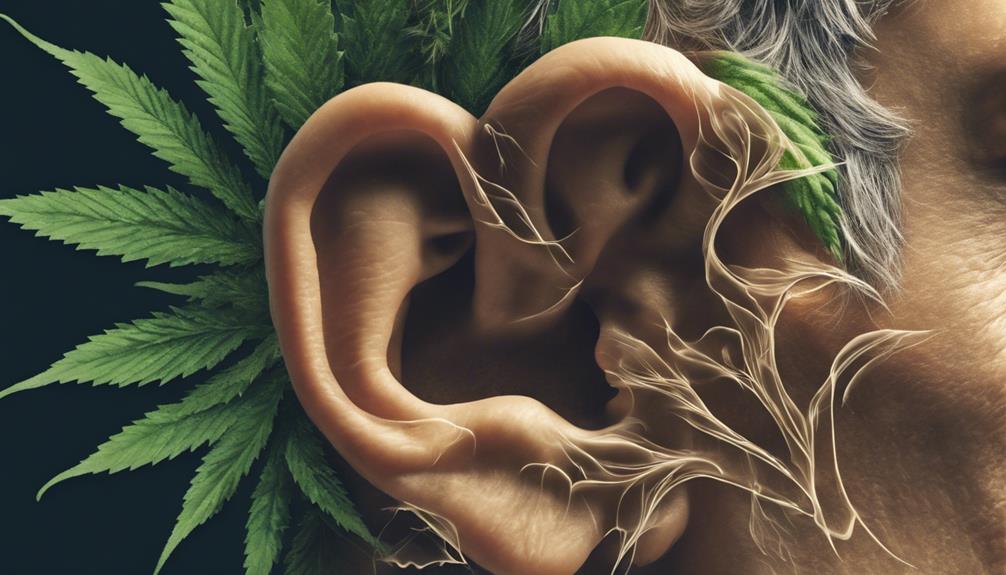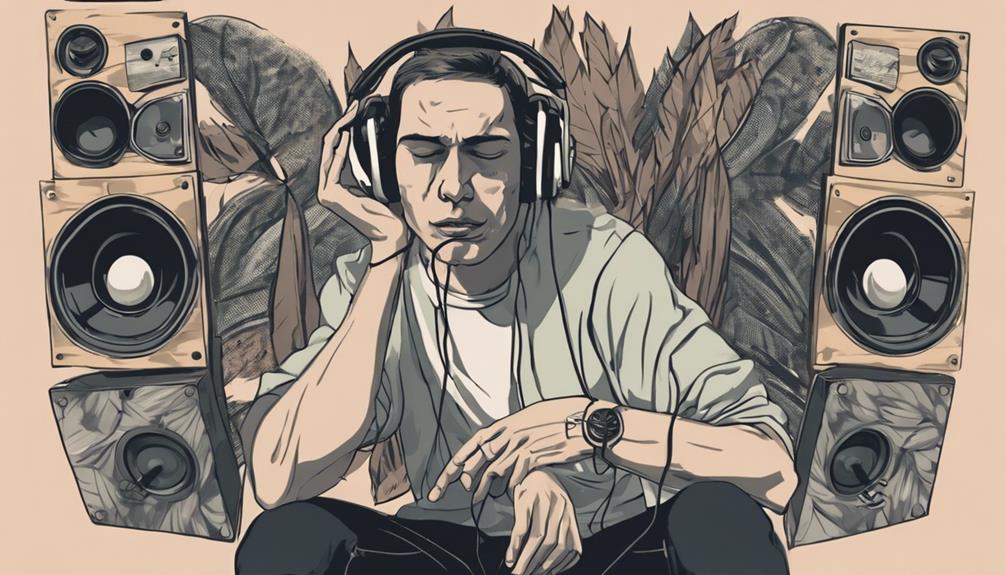Have you ever wondered if there is a connection between marijuana use and hearing loss?
Some intriguing findings suggest that cannabis might have an impact on our ability to hear, but the full extent of this relationship is still not fully understood.
As we explore this complex topic, we will uncover the potential mechanisms through which weed could contribute to hearing issues.
Stay tuned to uncover the surprising ways in which cannabis may influence our auditory health.
Key Takeaways
- Marijuana use is linked to tinnitus, affecting over 20% of users.
- Cannabinoids influence the auditory system and may induce hearing loss.
- Cannabis users have a higher risk of tinnitus onset or worsening.
- Protective measures, like limiting exposure to loud noises, can help minimize hearing loss risks.
The Science Behind Marijuana-Induced Hearing Loss
We've observed a compelling association between marijuana use and an increased risk of developing tinnitus, as indicated by several studies in the field of audiology. Tinnitus, often described as ringing in the ears, is a common symptom experienced by over 20% of marijuana users. This condition is linked to sensorineural hearing loss, which involves damage to the inner ear or the nerve pathways that connect the ear to the brain.
Cannabinoids, the active compounds in marijuana, have been implicated in the development or exacerbation of tinnitus symptoms. While research has shown a clear connection between smoking marijuana and an increased likelihood of experiencing tinnitus, the specific mechanisms behind how cannabinoids induce hearing loss, including tinnitus, aren't yet fully understood and necessitate further investigation.
Understanding the relationship between marijuana use, cannabinoids, and tinnitus is crucial for informing individuals about the potential risks associated with cannabis consumption on hearing health. By delving deeper into these mechanisms, we can develop strategies to mitigate the impact of marijuana-induced hearing issues.
Understanding the Mechanisms of Hearing Damage

The link between marijuana use and the development of tinnitus highlights the need to explore the intricate mechanisms underlying cannabis-induced hearing damage. Cannabinoids, the active compounds in marijuana, have been shown to have effects on the auditory system, potentially leading to conditions like tinnitus. Tinnitus, a neuroimmunological condition characterized by ringing in the ears, has been associated with cannabinoid use, with over 20% of users reporting experiencing tinnitus symptoms.
While the exact mechanisms by which cannabinoids cause tinnitus aren't fully elucidated, research suggests a significant correlation between marijuana use and the onset or exacerbation of tinnitus. It's clear that cannabinoids have an impact on the middle ear, but the specific pathways through which they influence tinnitus remain a subject of ongoing study. Understanding the intricate interplay between cannabinoid effects and the auditory system is crucial for making informed decisions regarding the potential risks of cannabis on hearing health.
Further research in this area is vital to unravel the complexities of cannabis-induced hearing damage.
Risks of Cannabis Use on Hearing Health
Research indicates a potential correlation between cannabis use and an increased risk of developing tinnitus, a condition characterized by ringing in the ears. Studies have shown that over 20% of cannabis users report experiencing symptoms of tinnitus, suggesting a link between cannabis use and hearing issues. Individuals who use marijuana are significantly more likely to experience tinnitus compared to non-users.
Smoking and cannabis consumption have been linked to the onset or worsening of tinnitus symptoms, underscoring the potential negative impact on hearing health. While the precise mechanisms through which cannabis affects hearing remain unclear, the association between cannabinoids and tinnitus necessitates further investigation for a better grasp of the potential risks.
Understanding the implications of cannabis use on hearing health is crucial for individuals who partake in its consumption. By acknowledging these risks, users can make informed decisions to protect their auditory well-being.
Tips for Minimizing Hearing Loss From Weed

Exploring strategies to mitigate the risk of hearing loss associated with weed use is crucial for maintaining optimal auditory health. When consuming cannabis, consider the following protective measures to minimize the potential impact on your hearing:
- Limit Exposure: Be mindful of the duration and volume of exposure to loud noises while using weed. Prolonged exposure to high decibel levels can increase the risk of hearing damage.
- Use Noise-canceling Devices: Invest in noise-canceling headphones or earplugs to create a quieter environment when consuming weed in noisy settings. This can help shield your ears from harmful noise levels.
- Take Regular Breaks: Give your auditory system a break by stepping away from loud environments during weed consumption. This can reduce the strain on your ears and lower the likelihood of long-term damage.
Seeking Help for Cannabis-Related Hearing Issues
Considering the potential impact of cannabis on hearing health, seeking professional assistance for cannabis-related hearing issues is crucial for early intervention and management. Research has shown a concerning association between cannabis use and tinnitus symptoms. Studies indicate that over 20% of individuals using cannabinoids report experiencing tinnitus, with marijuana users showing a significantly higher likelihood of developing these symptoms. Both smoking and cannabinoid consumption have been linked to the onset of tinnitus, highlighting the need for further research to fully understand this connection.
When experiencing cannabis-related hearing issues such as tinnitus, it's vital to consult with healthcare providers specializing in audiology or otolaryngology. These professionals can conduct thorough evaluations to assess the extent of the hearing problem and recommend appropriate treatment options. Early intervention is key in managing cannabis-related hearing issues effectively. Seeking help promptly not only addresses the current symptoms but also prevents potential long-term complications. Therefore, individuals facing such concerns should prioritize seeking expert assistance for proper evaluation and care.
Frequently Asked Questions
How Long Does It Take for Cannabinoid Receptors to Return to Normal?
When we discontinue cannabis use, cannabinoid receptors generally return to normal levels within a few days to weeks. Factors like frequency and duration of use can influence this timeline.
Research indicates that chronic cannabis consumption may result in longer-lasting changes in receptor expression. While acute cannabis intake can lead to temporary downregulation, it typically reverses over time.
Individual differences in metabolism and genetics also play a role in how quickly cannabinoid receptors recover to baseline levels.
What Are the Long Term Side Effects of Marijuana's Mayo Clinic?
When considering the long-term side effects of marijuana according to the Mayo Clinic, we find a range of potential concerns.
These include respiratory issues, decreased mental sharpness, addiction risks, memory problems, cognitive impairment, mental health disorders, and lung health impacts like chronic bronchitis.
The clinic also cautions about addiction, dependency, and withdrawal symptoms with prolonged use.
It's essential to be aware of these potential consequences when evaluating marijuana use.
Conclusion
As we navigate the complex landscape of cannabis and its potential impact on hearing health, it's crucial to approach the subject with caution and awareness.
Just as we carefully tend to a delicate flower in a garden, we must nurture our auditory system with the same level of care and attention.
By staying informed, seeking help when needed, and taking proactive steps to protect our hearing, we can safeguard this precious sense for a lifetime of vibrant sound.











